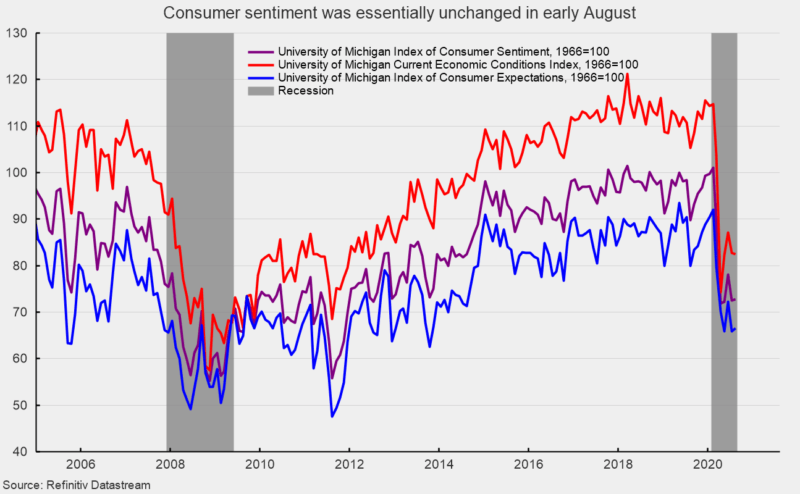Lack of Confidence in Government Stifles Consumer Sentiment Recovery
The preliminary August results from the University of Michigan Surveys of Consumers show overall consumer sentiment was roughly unchanged in early August and remains well below pre-lockdown levels. A lack of confidence in government policies was a key theme driving the weak results.
Overall consumer sentiment increased slightly to 72.8 in early August, up from 72.5 in July, a 0.4 percent rise (see chart). From a year ago, the index is still down 18.9 percent. The sub-indexes posted opposing changes in early August. The current-economic-conditions index fell to 82.5 from 82.8 in July (see chart). That is a 0.4 percent drop and leaves the index with a 21.7 percent decrease from August 2019.
The second sub-index — that of consumer expectations, one of the AIER leading indicators — rose 0.6 points or 0.9 percent for the month to 66.5 (see chart) but is 16.8 percent below the prior year. According to the report, “Two significant changes since April have been that consumers have become more pessimistic about the five-year economic outlook (-18 points) and more optimistic about buying conditions (+21). Lower interest rates by the Fed prompted more favorable buying, especially for homes, and the DC policy gridlock was responsible for the weaker outlook.”
The report goes on to add, “The overall confidence in economic policies fell to the lowest level since Trump first entered office. The policy gridlock has acted to increase uncertainty and heightened the need for precautionary funds to offset lapses in economic relief programs and to hedge against fears about the persistence and spread of the coronavirus as the school year gets underway. Bad economic times are anticipated to persist not only during the year ahead, but the majority of consumers expect no return to a period of uninterrupted growth over the next five years. Consumers anticipate declines in the national unemployment rate to significantly slow and expect a rising rate of inflation during the year ahead.”
Those concerns may act as a restraint on consumer spending, resulting in a slow and drawn out recovery from the sharp plunge in economic activity. The report states, “While a positive growth rate in consumption is anticipated in the 2nd half of 2020, it will hardly herald the end of the coronavirus recession.”






